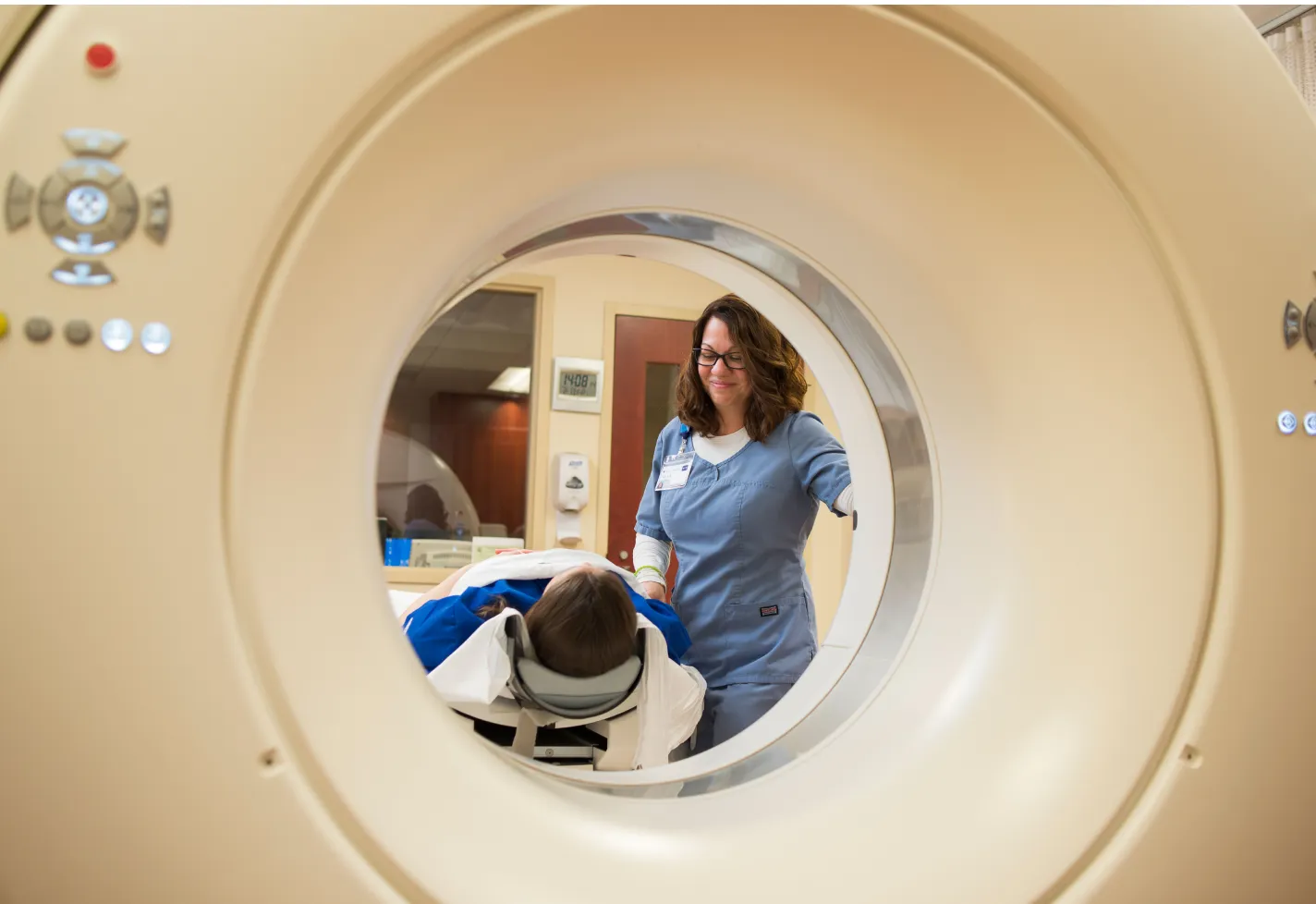Nuclear Medicine
Enhanced imaging, transformative results
Nuclear medicine imaging is an advanced type of diagnostic imaging that helps measure how well your internal organs are working. Nuclear medicine can make it possible to discover conditions without the need for surgery, particularly in the condition’s earliest — and most easily treated — stages. It also helps us learn to better serve you by checking how well existing treatment is working so we can adapt your care plan if needed.
Schedule Your Imaging Appointment.
What Nuclear Medicine Tests
Nuclear medicine scans help diagnose and inform care plans for conditions like:
- Many types of tumors and cancers, including thyroid, lymph node, and bone
- Heart disease
- Hormone disorders and overactive thyroid
- Brain and digestive disorders
- Infection

PET CT Scans
One specialized nuclear medicine procedure at Novant Health is a combined positron emission tomography (PET) and computed tomography (CT) scan, or PET CT scan.
By fusing the detailed, 3D PET and CT images, we can not only identify a tumor (PET) — we can pinpoint exactly where it is in your body (CT). This remarkable accuracy helps improve outcomes. And, combining the two tests means added convenience for you: you receive two advanced scans during one seamless visit using a single piece of equipment.
What to Expect

- Remove anything that could have metal in it, including dentures, wigs, hearing aids, jewelry, belts, zips, hooks, buckles, hair ornaments, watches, studs, keys, and coins.
- Wear loose, comfortable clothes. You may be asked to wear a hospital gown during your exam.
- Follow any other instructions from your care team on how to prepare, including if you need to change your eating, drinking, or medication habits.

What the procedure looks like depends on the nuclear medicine scan you're getting. With most procedures, small, safe amounts of radioactive material, called radiopharmaceuticals, are put into your body. Medical imaging specialists then use a special camera and computer to detect the radiation and create images to study.

- Talk to your care team if you have a fear of being in enclosed spaces (claustrophobia).
- Unless your care team tells you otherwise, you will not need to recover — you can go about your normal activities as usual right after the exam.

Tell your care team if you are pregnant, think you may be pregnant, or are breastfeeding. They may suggest a different exam, such as an MRI or ultrasound.

It is important that you keep your scheduled imaging appointment. If you will be late due to an emergency, please call our scheduling team as soon as possible to cancel or reschedule.
Bring the following documents to your appointment:
- Referral form from your doctor
- Current insurance card
- Contact information
- Payment (if applicable)
Be sure to take advantage of Novant Health’s many free healthcare cost planning resources, including financial navigators.

A radiologist will review your medical images and report their findings to your doctor 24 to 72 hours after your exam. Your doctor will contact you to discuss your results.
Take advantage of Novant Health MyChart to:
- View your imaging results as soon as they’re available
- Contact your doctor
- Schedule appointments
For Your Safety

It's possible you may be given a contrast solution for this exam. This helps make your images as clear as possible. If a contrast solution is needed, it's possible you may:
- Be given the solution through an injection or intravenous line (IV)
- Need to adjust your eating and drinking habits before the exam
- Have some mild side effects
When contrast is needed, it's possible the scan could have more risk for certain people. Make sure your care team knows:
- If you have any allergies at all, especially to iodine or contrast solution
- Your long-term and recent medical history
- Any medications or supplements you take
Allergic reactions are extremely rare. If you do have a reaction, our expert providers are trained to provide the help you need.

Your Well-Being Is Our Priority.
If you have any anxiety about your imaging procedure, reach out to your care team. Novant Health's experienced providers are ready to listen and help put you at ease.
Find Imaging Centers Near You.
The care team referring you for imaging may help you set up your appointment at a particular location. You can also choose to schedule your imaging appointment at the imaging center most convenient to you. Visit individual imaging center websites to learn which specific types of imaging are offered at or to schedule at that location.

Referring a Patient?
If you're a referring physician or healthcare professional, we can help you find the right specialist, programs and services for your patient.
